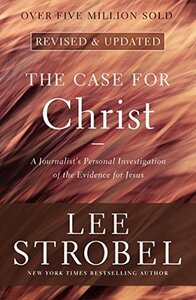Take a photo of a barcode or cover
398 reviews for:
The Case for Christ: A Journalist's Personal Investigation of the Evidence for Jesus
Lee Strobel
398 reviews for:
The Case for Christ: A Journalist's Personal Investigation of the Evidence for Jesus
Lee Strobel
I won't review this book but rather tell you to read the other reviews. They are mostly 5 stars or 1 star. Either you love it or hate it. I'll leave my rating in the middle.
informative
inspiring
slow-paced
The author compares his investigation of the evidence for Christianity to his investigation of evidence for a legal case when he worked as a lawyer. While I appreciate the point he is making, this constant method of comparison becomes a bit tedious; as a reader, I just want to get on with the apologetics. His interview style is likewise wearying. While he's telling me what professor this or that is doing with his pipe before answering his question, I just want to say, "Get to the point." The interviews themselves seem a bit contrived, as though he was selecting and arranging his questions in order to produce a certain set of desired responses: leading the witness, so to speak. When reading his accounts of these interviews, I did not feel persuaded that Strobel was being convinced of the evidence for Christianity via his investigation, but that he was already convinced prior to the interviews, and that the interviews themselves are little more than a rhetorical device. There's nothing wrong with using rhetorical devices in apologetics, but then you shouldn't pretend it's something other than a device, and Strobel pretends it's an empirical investigation born of doubt; I think this tactic is very much going to hurt his case with atheists and agnostics who will see it (perhaps not wrongly) as a ploy and then consequently discount the very real and otherwise persuasive evidence he does present.
In short, I would have preferred a straightforward recounting of the evidence on behalf of Christianity. There are many nuggets of persuasive value in this book, but you have to wade through a lot of extraneous material to get there. I wasn't learning anything I haven't already read before in other, more concise or more poetical apologetics, and so I ended up putting the book aside unfinished. If I were to suggest an apologetic, it would not be this one. I would suggest Mere Christianity, Misquoting Jesus, or What's So Great About Christianity long before I would suggest this one.
In short, I would have preferred a straightforward recounting of the evidence on behalf of Christianity. There are many nuggets of persuasive value in this book, but you have to wade through a lot of extraneous material to get there. I wasn't learning anything I haven't already read before in other, more concise or more poetical apologetics, and so I ended up putting the book aside unfinished. If I were to suggest an apologetic, it would not be this one. I would suggest Mere Christianity, Misquoting Jesus, or What's So Great About Christianity long before I would suggest this one.
challenging
hopeful
informative
inspiring
reflective
fast-paced
What I Thought About the Book:
The book was informative, and all Christians need to read this book. My faith is strong, but this book strengthened it. In this book, I gathered evidence that supports the truth of Jesus's life, resurrection, and more.
Quotes:
"Of course, the resurrection was the ultimate vindication of his identity. But of the many things he did, one of the most striking to me is his forgiving of sins."
"Literally, excruciating means 'out of the cross.' Think of that: they needed to create a new word because there was nothing in the language that could describe the intense anguish caused during the crucifixion."
"What could possibly have motivated a person to agree to endure this sort of punishment?"
"So when you ask what motivated him," he concluded, "well...I suppose the answer can be summed up in one word- and that would be love."
"Losing my wife was the most painful experience I've ever had to face, but if the resurrection could get me through that, it can get me through anything."
The book was informative, and all Christians need to read this book. My faith is strong, but this book strengthened it. In this book, I gathered evidence that supports the truth of Jesus's life, resurrection, and more.
Quotes:
"Of course, the resurrection was the ultimate vindication of his identity. But of the many things he did, one of the most striking to me is his forgiving of sins."
"Literally, excruciating means 'out of the cross.' Think of that: they needed to create a new word because there was nothing in the language that could describe the intense anguish caused during the crucifixion."
"What could possibly have motivated a person to agree to endure this sort of punishment?"
"So when you ask what motivated him," he concluded, "well...I suppose the answer can be summed up in one word- and that would be love."
"Losing my wife was the most painful experience I've ever had to face, but if the resurrection could get me through that, it can get me through anything."
adventurous
challenging
hopeful
informative
inspiring
medium-paced
Lee Strobel's "The Case for Christ" serves as a compelling resource for Christians aiming to reinforce their belief in the historical soundness of Jesus' story. Strobel, a former investigative journalist, embarks on a journey to explore the evidence surrounding the life, death, and resurrection of Jesus Christ, interviewing experts from various fields, including archaeology, theology, and history. His thorough approach provides a solid foundation for readers seeking to understand the context and credibility of the biblical narrative.
For those in search of the ultimate validation of Christianity, it is essential to remember that faith plays a crucial role. While Strobel presents a wealth of evidence supporting the historicity of Jesus, the book ultimately emphasizes that belief in Christ transcends mere factual verification. At its core, faith is a personal journey, and Strobel's work encourages readers to embrace that journey while exploring the historical context.
One of the standout features of "The Case for Christ" is how it frames the Bible within the broader context of historical documentation. Strobel highlights the methods by which histories have been passed down through generations, allowing readers to appreciate the Bible not merely as a religious text but as a historical document with roots in the ancient world. This perspective enriches the reader's understanding of Christianity and its development over time.
Moreover, for those who have not previously studied Christianity from a historical viewpoint, Strobel's book is useful. It dismantles the misconception that our current understanding of the faith emerged from thin air or is based solely on myth. By providing a well-researched narrative of the evidence supporting the life of Jesus, Strobel fosters a deeper appreciation for the origins of Christianity and its relevance in today’s world.
In conclusion, "The Case for Christ" is an essential read for Christians seeking to solidify their faith in the historical validity of Jesus’ story. While it presents compelling evidence, it also serves as a reminder that faith is ultimately a personal choice. By framing the Bible's narrative within the context of historical scholarship, Strobel offers a valuable resource for both believers and those curious about the foundations of Christianity.
For those in search of the ultimate validation of Christianity, it is essential to remember that faith plays a crucial role. While Strobel presents a wealth of evidence supporting the historicity of Jesus, the book ultimately emphasizes that belief in Christ transcends mere factual verification. At its core, faith is a personal journey, and Strobel's work encourages readers to embrace that journey while exploring the historical context.
One of the standout features of "The Case for Christ" is how it frames the Bible within the broader context of historical documentation. Strobel highlights the methods by which histories have been passed down through generations, allowing readers to appreciate the Bible not merely as a religious text but as a historical document with roots in the ancient world. This perspective enriches the reader's understanding of Christianity and its development over time.
Moreover, for those who have not previously studied Christianity from a historical viewpoint, Strobel's book is useful. It dismantles the misconception that our current understanding of the faith emerged from thin air or is based solely on myth. By providing a well-researched narrative of the evidence supporting the life of Jesus, Strobel fosters a deeper appreciation for the origins of Christianity and its relevance in today’s world.
In conclusion, "The Case for Christ" is an essential read for Christians seeking to solidify their faith in the historical validity of Jesus’ story. While it presents compelling evidence, it also serves as a reminder that faith is ultimately a personal choice. By framing the Bible's narrative within the context of historical scholarship, Strobel offers a valuable resource for both believers and those curious about the foundations of Christianity.
informative
slow-paced
Lee Strobel did some research, but applied it in ways that are counter-intuitive. I appreciate that he settled his own struggles with faith and God, but there is not sufficient evidence to reach the conclusions he posits. There is a reason that there is debate on the topic of Christ, and it is not going to be settled by this argument. I read through this book in an afternoon, looking for any new information that may have been there.
challenging
hopeful
informative
reflective
medium-paced




